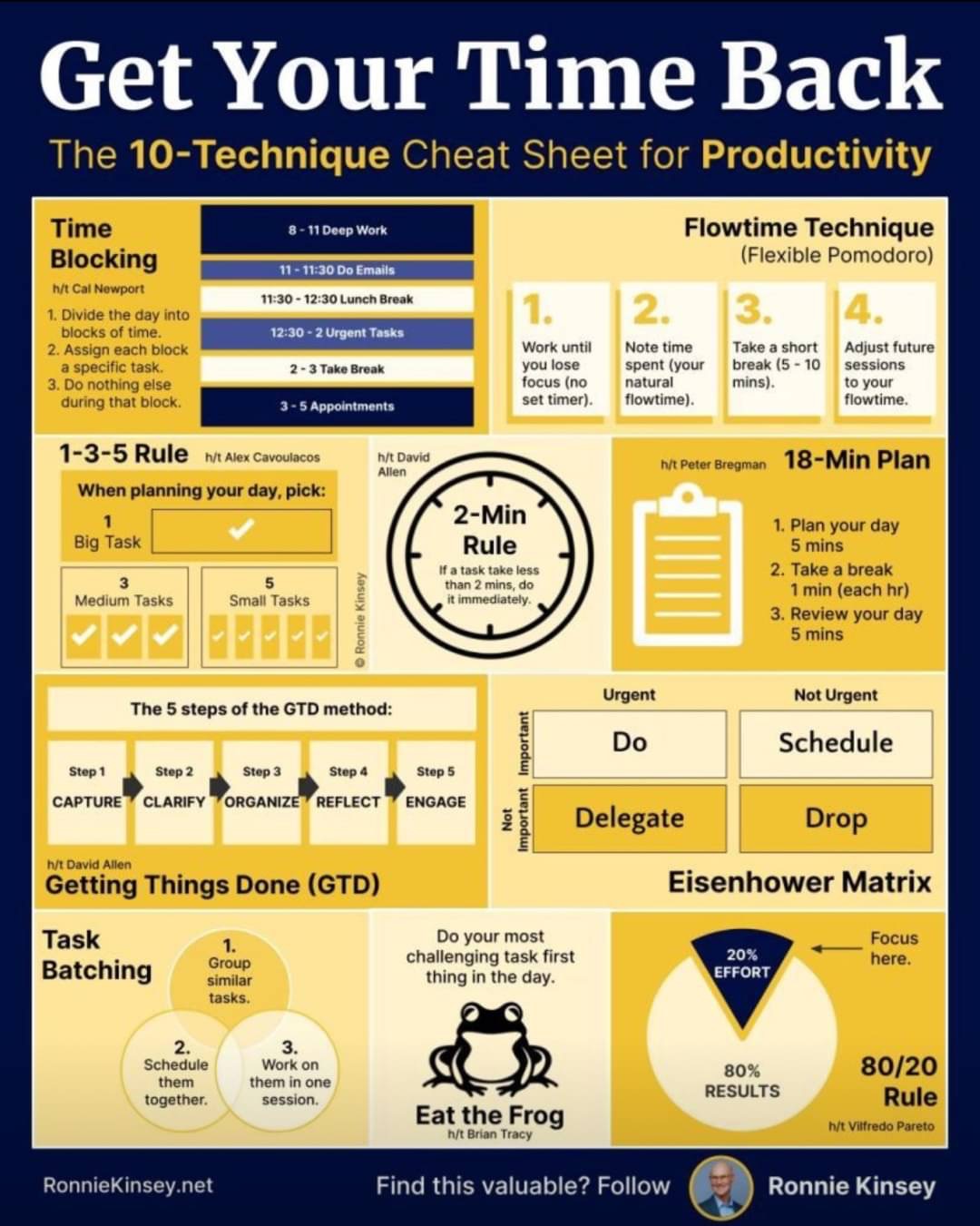Getting Things Done
I put here some notes I made after reading Getting Things Done book and a few other books. So some things are absent in GTD technique and a lot of things from the original technique are omitted.
Vertical planning
Plan your next ~90 days.
Ninety days seems to be the range where ambition and planning actually fall reasonably close together.
The End of Jobs by Taylor Pearson
Redefine your goals periodically.
We need to constantly define (and redefine) what we're trying to accomplish on many different levels, and consistently relocate resources toward getting these tasks complete as effectively and efficiently as possible.
Getting Things Done by David Allen

Your Reason for Being

Horizontal planning
Create projects (project - any outcome requiring more than one step that you're committed to achieve within a year) for everything you are going to accomplish. Use "External brain" to store your projects.
Reviews
Critical success factor: the weekly review.
External brain
Your mind is for having ideas, not for holding them.
Getting Things Done by David Allen
External brain - tools that can do routine categorization and remembering for us.
Information
Consider a future device for individual use, which is a sort of mechanized private file and library. It needs a name, and, to coin one at random, "memex" will do. A memex is a device in which an individual stores all his books, records, and communications, and which is mechanized so that it may be consulted with exceeding speed and flexibility. It is an enlarged intimate supplement to his memory.
Vannevar Bush, As We May Think, 1945
Thoughts, ideas, links, etc. may be useful in future.
I don't need to remember, I write it all.
Calendar
All unfinished in any way things must be captured into a trusted system outside your brain.
Set up reminders and forget.
Lists
Lists:
- Someday/Maybe
- Books to read
- Movies to watch
- Music to listen
- Trips to go
- Web sites to surf
- Events to attend
- Ideas (general)
- To buy at ...
- ...
Someday/Maybe are not throwaway items. They may be some of the most interesting and creative things you'll ever get involved with.
Executing plans
How to choose an action to execute next
The Importance Vs Urgency Matrix (attributed to President Eisenhower and popularised by Stephen Covey):

Important/Not urgent is the place where magic happens. Executing actions from this category you moving your most exciting projects forward.
About procrastination: Inside the mind of a master procrastinator | Tim Urban.
Goldratt's framework (What is your primary limit in completing the project?):
- What's the system?
- What's the current limit?
- What's the obvious way to improve the limit?
Action execution
Execution may be one of:
- Do it now
- Schedule it
- Incubate (might need to be done later, but there is no exact date known)
- Delegate it
- Reference (potentially useful information)
- Put it into a trash bin (if an action is no more required)
Do it now
If an action will take less than two minutes, it should be done at the moment it's defined.
Getting Things Done by David Allen
Schedule it
Schedule and forget. It's a waste of time and energy (literally, a human brain consumes about 20% of energy produced by the human body) to keep thinking about something you make no progress on.
This consistent, unproductive preoccupation with all the things we have to do is the single largest consumer of time and energy.
Kerry Gleeson
Reminder must be reliable. Must be a place I know I will, without fail, look.
Next action
Each project in progress must have a next action specified.
Frustration
Happens because of unfilled agreements.
How to solve:
- Don't make the agreement
- Complete the agreement
- Renegotiate (a renegotiated agreement is not a broken one) the agreement
As humans, we love to work but dislike the obligation of it.
Motivation
Small wins can keep you motivated.
The secret of getting ahead is getting started. The secret of getting started is breaking your complex overwhelming tasks into small, manageable tasks, and then starting on the first one.
Mark Twain
Vocabulary
GTD
GTD (Getting Things Done) is a time-management method, described in a book of the same title by productivity consultant David Allen.
GTD essential: recognizes anything that has your attention (concerns, worries, problems, issues, tensions) and translates them into achievable outcomes (projects), to be executed with concrete next actions.
Next action
Next action - the next physical, visible activity that progress something toward completion. It is specific enough so that you know where it happens, and with what tools (if any). What "doing" looks like.
Wisdom consists not so much in knowing what to do in the ultimate as in knowing what to do next.
Herbert Hoover
Project
Project - any outcome requiring more than one step that you're committed to achieve within a year.
Discipline
Discipline is when you are tired, you want to turn off the alarm and sleep in, but you get up and do what needs to be done.
Discipline is when you do what you do not want to do now, so you can get what you do want in your life later.
Stop chasing for motivation and get discipline.
CheatSheet

Links
Getting Things Done: The Art of Stress-free Productivity by David Allen
The End of Jobs by Taylor Pearson
The Monk Who Sold His Ferrari by Robin Sharma
GyShiDo - the art of getting your shit done
15 Secrets Successful People Know About Time Management by Kevin Kruse